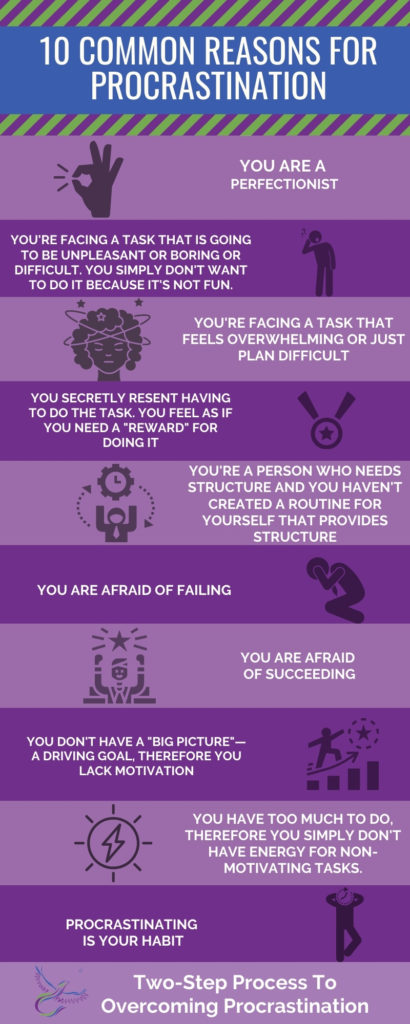What do you procrastinate doing in your business?
Is it finishing the proposal for the biggest prospect you’ve ever had? Is it following up with the people you met at the conference?
The two-step process to overcoming procrastination are simple, but may not be easy.
It will depend on how well you know yourself. Even more importantly, it will depend on how honest you are about yourself.
The first step to overcoming procrastination is to be honest about the cause.
10 Most Common Reasons for Procrastinating
- You are a perfectionist.
- You’re facing a task that is going to be unpleasant or boring or difficult. You simply don’t want to do it because it’s not fun.
- You’re facing a task that feels overwhelming or just plain too difficult.
- You secretly resent having to do the task. You feel as if you need a “reward” for doing it.
- You’re a person who needs structure and you haven’t created a routine for yourself that provides structure.
- You are afraid of failing.
- You are afraid of succeeding.
- You don’t have a “big picture”—a driving goal, therefore you lack motivation
- You have too much to do, therefore you simply don’t have the energy for non-motivating tasks.
What’s Stopping You?
Did any of these ring a bell with you? Did more than one of these issues do so?
If so, you are human! Most of us have experienced these reasons more than once. Maybe a combination of them.
I have a fear of being wrong and being ridiculed. (That’s for another blog post.) My fear of failure has stopped me from pursuing many dreams in the past.
Let’s say you realized that you commonly procrastinate because you fear success. Maybe you fear what could happen when you are successful, and so you avoid doing anything that would lead you in that direction.
If you fear success, instead of thinking of the big picture and avoiding any productive actions, just focus on what you can do today. Concentrate on small actions in the right direction.
If you have a fear of failure, you can benefit from the same strategy for people who have a fear of success. Focus on what you want to achieve that single day.
With either fear, your cause may be combined with perfectionism.
With perfectionists, the idea of tackling anything involving a learning curve, or that someone else—like a client—will have to judge can be paralyzing. You want to do a perfect job, every time—and will freeze up when you fear you can’t.
The Top Reason Why You Procrastinate
I promised you ten reasons for procrastination, and so far we’ve only spoken of nine. That brings us to the number one, all-time common reason for procrastinating:
Procrastinating is your habit.
Did that hit the bullseye? Or maybe you have already labeled yourself as a procrastinator, so, therefore, this is what you always do.
No matter what your most common reason for procrastinating might be, the next step will put you on the path to overcoming it.
The second step in overcoming procrastination is to look at your habits when you do procrastinate.
Let’s look at the definition of “habit”.
Habits are formed through repetition. The neural pathways of your brain are “trained” to repeat the habitual response to any situation—and the more you do it, the harder it is to change that response.
Think of it like walking the same route to work every day, and taking a shortcut through a tract of grass because it gets you there ten minutes more quickly.
If you take this shortcut through the grass every single day, pretty soon you’ve worn down a nice, smooth track.
You are not going to beat your way through the bushes or get your ankles wet creating a new variation of that path the next morning: You’re going to follow the nice smooth path you’ve already created.
That is literally what is happening with your brain, when you create a habit.
Repeat the habit of procrastination often enough and it becomes the path of least resistance.
Your brain has now become hardwired to procrastinate when faced with “trigger” situations. This is just human nature, so you are not a failure.
You’re only doing what all of us have done sometime or other in our lives.
Is Your Smartphone Part of Your Procrastination Habit?
What’s your habit when you avoid doing something? Mine was picking up my phone and playing a puzzle game.
I finally decided to delete the game altogether from my phone. When I picked up my phone out of habit and remembering that I didn’t have the game anymore.
Taking away the distraction made me focus on a task I was avoiding.
What can you do to break your habit of procrastination?
Your Why Can Move You Out of Procrastination Into Action
Find your inspiration that is more powerful than the habit and a strategy or tactic that is best suited to your root causes and personality traits.
Find your why that will help you overcome the bad habit and create a new, more rewarding one.
If you would like support in overcoming procrastination to build your business, schedule a complimentary Discovery Session with me.

